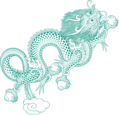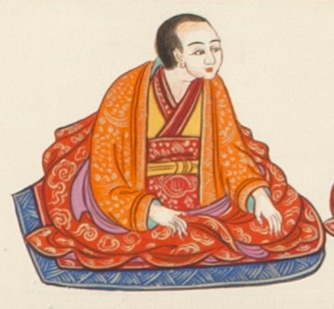Letter from Buddhaguhya
Rje ’bangs dang bod btsun rnams la spring yig (Bhotasvāmidālekha)
Introduction
Buddhaguhya was an Indian master, known in Tibetan as Sangs rgyas gsang ba. Based in Varanasi, he was invited by Tri Song Detsen (Khri srong lde'u btsan) to go to Tibet, but was unable to do so, so he wrote the king a letter, known as the Bhoṭasvāmidāsalekha. This letter is addressed to the king, his people, and the Tibetan clerics, with instructions about how to behave and descriptions of ideal models for the king, ministers, and different levels of monks. It was apparently composed between 780 and 790, after the ordination of the first Tibetan monks but before the Samye debate (Dietz 1984). A version has been preserved in the Tibetan Tenjur (bsTan 'gyur) scripture commentaries, although it is also generally acknowledged that some parts of this text must have been composed later (Karmay 1998: 25; Davidson 2005: 22, n.1)
Download this resource as a PDF:
Sources
bsTan ʼgyur (Tenjur), Dpe bsdur ma edition. 1994–2008. Beijing: Krung go'i bod rig pa'i dpe skrun khang, Vol. 96, pp. 943–55. TBRC: W1PD95844. [Modern edition]
bsTan ’gyur (Tenjur), sDe dge edition (18th century), Vol. 173 (nge), folios 135r–139r. TOH 4194. TBRC: W23703, vol. 173, pp.271–79. [Xylograph edition]
References
Davidson, Ronald M. 2005. Tibetan Renaissance: Tantric Buddhism in the Rebirth of Tibetan Culture. New York: Columbia University Press.
Dietz, Siglinde. 1984. Die Buddhistiche Briefliteratur Indiens. Wiesbaden: Otto Harrassowitz, pp. 79–85, 358–99.
Karmay, Samten. 1988. The Arrow and the Spindle: Studies in History, Myths, Rituals, and Beliefs in Tibet. Kathmandu: Mandala Book Point.
Stein, R.A. 1986. Tibetica Antiqua IV: La Tradition Relative au Début du Bouddhisme au Tibet. Bulletin de l'Ecole Francaise d'Extreme-Orient. 74: 169–196 (at p. 185).
Outline
The text can be divided into 76 stanzas of four to five lines of nine syllables each.
The Prologue addresses Tri Song Detsen and praises his ancestry. It attributes the introduction of Buddhism into Tibet to Khri rje thog bstan, father of the fifth-century Lha tho tho ri.
- Prologue (10 stanzas)
- Instructions to kings (26 stanzas)
- Instructions to ministers (14 stanzas)
- Instructions to high ranking monks (6 stanzas)
- Instructions to lower ranking monks (20 stanzas).
Extracts
Prologue
[Tenjur Modern ed, vol. 96, p. 943; Tenjur Xylograph ed, vol. 173, fol. 135r.]
།འཕགས་པ་འཇམ་དཔལ་ལ་ཕྱག་འཚལ་ལོ།
I offer my respects to ’Phags pa ’jam dpal (Ārya Mañjuśrī)
།བོད་ཀྱི་སྤུ་རྒྱལ་མགོ་ནག་ཡོངས་ཀྱི་རྗེ།
།ཁྲི་སྲོང་ལྡེའུ་བཙན་ཨག་ཚོམ་མེས་ཀྱི་སྲས།
།རླུང་ནམ་འཕྲུལ་གྱི་རྒྱལ་པོའི་དཔོན་པོ་ཡི།
།སྲོང་བཙན་སྒམ་པོ་སྤྱན་རས་གཟིགས་ཀྱི་སྐུ།
།བྱང་ཆུབ་སེམས་དཔའི་སྐུ་རྒྱུད་གདུང་མ་ཆད།
Oh Tibetan sPu rgyal, lord of the black-haired ones,
Khri srong lde’u btsan, son of Ag mes,
Grandson of King rLung nam ’phrul,
Srong btsan sgam po, with the form of sPyan ras gzigs (Avalokiteśvara),
Bodhisattva of an unbroken lineage.
།འགྲོ་དྲུག་ནང་ན་ཤེས་རིག་ཆེ་བའི་མི།
།དུག་ལྔ་སྡོང་པོ་རྒྱུད་དྲུག་ཀུན་གྱི་གཞི།
།ཁྲི་རྗེ་ཐོག་བཙན་མན་ཆད་བརྒྱུད་མ་ཡིན།
།དགེ་བཅུ་ཐང་ཁྲིམས་བཙུགས་ནས་དུལ་བར་མཛད།
You, with superior knowledge among the six types of beings,
The trunk of the five poisons and the basis of all six realms of existence,
Of the lineage of Khri rje thog btsan,
Having established the laws of the ten virtues (dge bcu thang khrims) [the realm] has been pacified [or, ‘all have been tamed’].
The text continues by relating how Śakyamuni went to Bodhgaya and taught the three Piṭakas, which eventually enabled Tri Song Detsen to open a window onto the darkness. Subsequently a number of wise men were converted to Buddhism and the influence of the religion grew. In order to effect further conversions, the king sent a number of scholars to learn the Indian language.
[Tenjur Modern ed, vol. 96, p. 944; Tenjur Xylograph ed, vol. 173, fol. 135v.]
སྲིད་ཀྱི་ཆབ་སྲིད་མངའ་ཐང་དགུང་ལ་རེག
།བུ་དྡྷ་གུ་ཧྱ་བདག་དངོས་གློ་བ་དགའ།
།ཆབ་སྲིད་ཡོ་བ་ཀུན་གྱི་གཞུང་སྲོང་ཞིང་།
།སྤྲུལ་པའི་རྒྱུད་མ་ཆད་པའི་ནང་ན་ལྡེ།
Since you have achieved the height of worldly power in the kingdom,
Buddhaguhya is truly delighted.
You have corrected [the behaviour of] all deceitful people in the realm,
You are from an unbroken line of incarnations.
།ཁྲི་སྲོང་ལྡེའུ་བཙན་མངའ་བདག་ཞལ་སྔ་ནས།
།མི་ཆོས་ལྷ་ཆོས་མངའ་ཐང་རྩེ་རུ་ཆིབས།
།རིན་ཆེན་འབར་བའི་སྐུ་ཡི་ཕུང་པོ་ལ།
།རླུང་མཁྲིས་བད་ཀན་འདུས་པའི་ནད་ཆེན་དང་།
།སྟོང་ཕྲག་བརྒྱད་ཅུའི་བགེགས་ཀྱིས་མ་བཙལ་བར།
།འཇམ་དཔལ་དང་ནི་མུ་རི་ཏ་ལ་ཁུམས།
Lord Khri srong lde’u bstan, you have said,
“Ride to the supreme authority of the worldly and divine customs (mi chos lha chos),
Whose richly resplendent body,
Is not afflicted by the great illnesses caused by the combination of wind, bile, and phlegm,
Or by the 80,000 obstructive demons”,
To ’Jam dpal (Mañjuśrī) and Mu ri ta (Murita).
This section concludes with Buddhaguhya lamenting that he does not have the strength to travel to Tibet, in response to the invitation of Tri Song Detsen.





